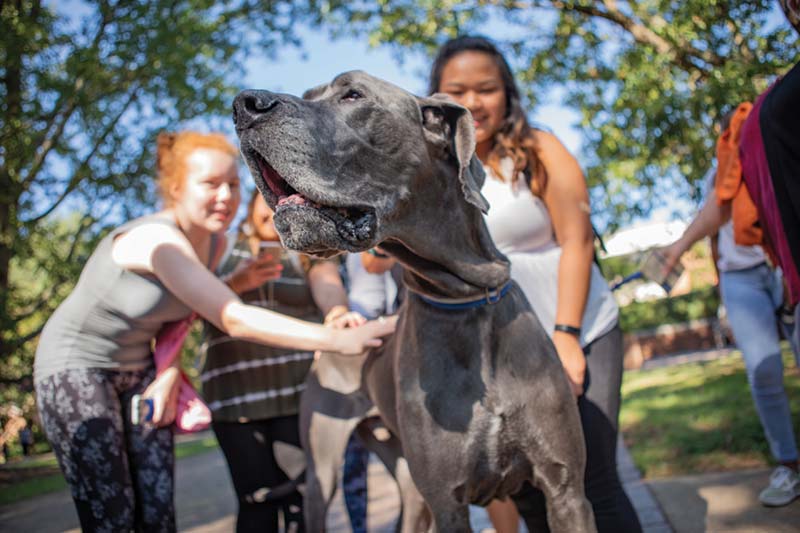Staying Strong
- By Sarah Lindenfield Hall
- Published

College, of course, has always presented hurdles, but, these days, students are struggling with more stress, anxiety, and depression than ever before. And resilience is an area of focus in higher education circles as institutions launch initiatives to support students.
At Meredith College, the effort to help students develop resilience is multi-pronged. Throughout the year, staff, students, and faculty are leading formal programs, sparking one-on-one chats and, even, cuddling with a trained therapy dog to cultivate their coping skills.
On campus, that work is now “culturally embedded,” said Mary Johnson, health services director. “It’s a priority from the top down and a need from the bottom up.”
Gen Z’s Bright Spots, Challenges
Today’s college students sit squarely in Generation Z, and they have a lot going for them. They value individual expression and civic causes, says McKinsey & Co.’s 2018 True Gen report. And they are poised to be the most diverse and well-educated generation yet, according to the Pew Research Center.
But they also face challenges. The generation is more likely than any other to report mental health issues, according to the American Psychological Association’s Stress in America
report. In fact, the American College Health Association found in 2018 that 63 percent of surveyed undergraduate students felt “overwhelming anxiety” in the previous year. During the same period, more than 40 percent felt so depressed that it was difficult to function.
These trends are playing out at Meredith where the counseling center has seen skyrocketing growth in the number of students who seek services. More often than in the past, students have trouble dealing with conflict, advocating for themselves, and forming relationships. They look to others to solve their problems and consider everyday challenges as major setbacks.
“Part of resilience and thriving is being able to be vulnerable and ask for what you need and use those resources to really thrive,” said Beth Meier, counseling center director. “That’s a tough thing.”
Helicopter parenting and social media often are blamed for the problems of today’s young adults. But an increasingly diverse student population also brings stressful life experiences.
Some students are first-generation college students. Others are supporting family members.
“It’s by no means the parents’ fault. It’s by no means social media’s fault,” Johnson said. “It’s just a horrible mix of what’s going on with today’s world. And there are so many different ways to combat it.”
Meeting Demand
 Programs that promote resilience have been offered at Meredith for years, but Ann Gleason, dean of students, said leaders now are more intentional about supporting students in creative ways.
Programs that promote resilience have been offered at Meredith for years, but Ann Gleason, dean of students, said leaders now are more intentional about supporting students in creative ways.
“As a college, we need to be able to make sure we’re responding to the changing needs of our student population,” Gleason said. “That really requires us to look at our programs, services, and activities to make sure we’re meeting the demand.”
For students, the message of strength and resilience often begins with StrongPoints®, Meredith’s advising and personal coaching program, she said. Incoming students identify their five strengths and learn how to apply them for a successful future. They’re encouraged to approach problems by focusing on how they can resolve them with their strengths instead of how their deficits might stymie them.
Once on campus, that message continues with programs to help students change their mindsets.
Some are fun. During Southern Smash, students use baseball bats to smash bathroom scales and let go of concerns about body image and other stigmas that hold them back. “It acknowledges the hardships of the past and moving forward with them, whether that’s just finding peace with it or going back and revisiting that thought, that feeling, that ideal and then growing from that,” Johnson said.
Other efforts are soothing. In a pilot project last year, Johnson brought in her trained therapy dog Lewis, a 160-pound European Great Dane. For students who are stressed, time with Lewis helped them reframe their emotions. “If they can have happiness in the moment,” said Johnson, who hopes to expand the program, they learn that “what’s bothering them is not going to control every minute of their day.”
 Last year, Johnson also introduced Koru, a mindfulness and meditation program for college students. Sessions filled up. “It does take a lot of intention to think about these things and center yourself to guide your body and mind,” said Rana Oueijan, ’19, a biology and public health major who participated in the program before graduating in May. “It was something to keep our minds from distracting us from being successful students.”
Last year, Johnson also introduced Koru, a mindfulness and meditation program for college students. Sessions filled up. “It does take a lot of intention to think about these things and center yourself to guide your body and mind,” said Rana Oueijan, ’19, a biology and public health major who participated in the program before graduating in May. “It was something to keep our minds from distracting us from being successful students.”
And, in April, Meredith won second place in a national competition that highlighted efforts to promote student wellness on campuses for its Communi-Tea. Participants made tea from the campus garden and learned about mindfulness, resilience, and thriving.
Other programs are more formal in nature. The Counseling Center offers one-on-one therapy. Anxiety screenings are offered in October. Resident assistants run through scenarios to help them respond to students in crisis. And the Office of Career Planning highlights the need for resilience as they have conversations with students about the rapid changes in the workplace.
“Our hope is,” said Dana Sumner, director of career planning, “we can help them manage their expectations, their reactions, their attitudes, and give them a picture of what the workplace will look like.”
A ‘Safe’ Place
Christa Soyars, a senior who is majoring in public health and psychology, calls herself a recovering perfectionist now. But, when she first started at Meredith, she set what she’d later realize were some impractical goals for herself.
“I wanted to have a fresh start and wanted to be the best I could and a little of my perfectionist ways came in, and I learned that’s just not healthy,” Soyars said. Today, she’s president of Peer Educators Advocating Responsible Lifestyles, a group of student counselors who promote healthy living and resilience. She often sees students struggling under enormous pressures.
“Being at Meredith, it’s helped me to know that we have such a supportive group of professors and small classes and we feel comfortable going to our professors when we need to ask questions and learn from what we messed up on,” she said. “… College is a great time to practice those skills in becoming more resilient, and Meredith provides a great place to do that safely because of all the support.”
Anxiety Coping Tools
To manage stress and cope with anxiety, Meredith’s counseling center recommends these strategies to combat negative thoughts and reduce anxiety:
Stop Before you react and “catastrophize” the situation, stop to think about your response to break old negative stress cycles and patterns.
Breathe To keep from tensing or holding your breath, breathe from your diaphragm. Know that it’s impossible to be tense and relaxed at the same time.
Reflect Think about why you feel concerned or threatened, what’s the worst that can happen, and whether you’re jumping to conclusions.
Choose Make a decision about what you want, what coping behaviors will work, and whether you have the time and skills to achieve a solution.
News Director
316 Johnson Hall
(919) 760-8087
Fax: (919) 760-8330


3800 Hillsborough Street Raleigh, NC 27607-5298 | (919) 760-8600 Fax: (919) 760-8330 | © 2022 All Rights Reserved.